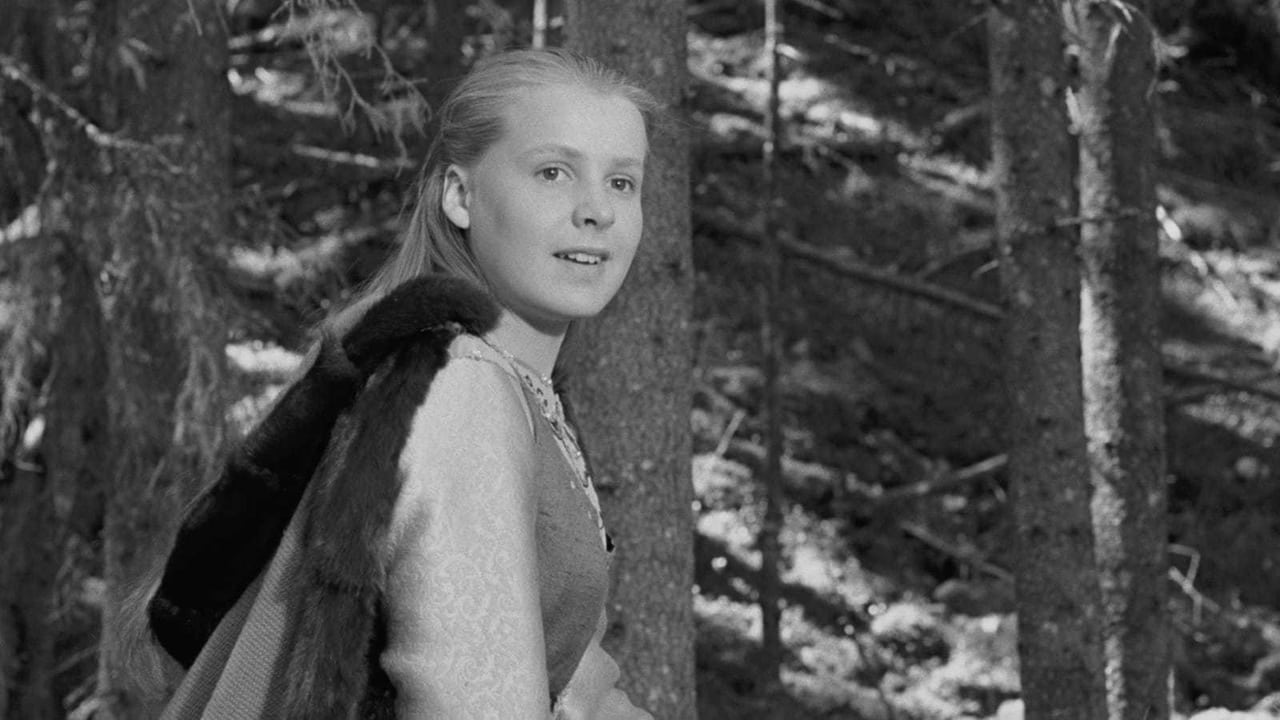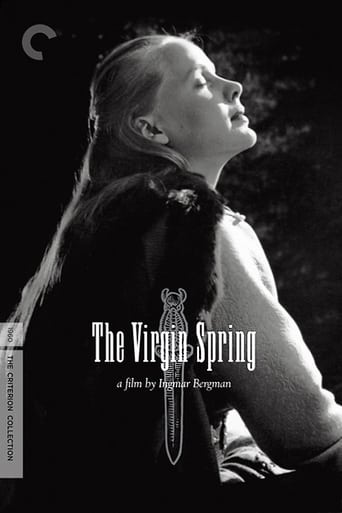Kirpianuscus
for me, for long time, it was adaptation of a story from Balkans. Haunting, tragic, an admirable proof of high art of detail. one of films who need to see for a special form of beauty of image and great performance, for the introduction status in the vision of a great director. a story about innocence and Medieval flavor and cruelty and justice. almost a poem in image. about murder and about implacable justice. about sin and about the truth. about a father and his daughter. and nothing more. because this film is real remarkable. or brilliant . or precious experience. so, see it !
Antonius Block
In watching these old Ingmar Bergman movies, the thought occurs to me that Bergman was to cinema what the golden age of Russian literature was to writing. His films have a certain depth to them, and feel meaty with their observations on human nature and their questions of religion and philosophy. 'The Virgin Spring', based on a 13th century Swedish ballad, is no exception.If you think about it, the story of 'The Virgin Spring' encapsulates quite a bit of the effect of religion on those who believe, starting with a girl needing to mind her chastity until marriage, and continuing on with a virgin must deliver candles for Matins. When a horrible thing happens to the girl, her companion and her mother both believe it's because of them, that God had listened to their jealous prayers, while her father is stricken and asks that time-old question, "God, how could you let this happen?" However, none of them challenge that most deeply held assertion, that God exists in the first place. After exacting brutal vengeance, including killing a child, the grief-ridden father asks God for forgiveness, and promises to build him a church on the site. He still believes in spite of it all, wants to remain upright in the best way he can conceive, and is both admirable and flawed at the same time.In telling this story with elements of Job ("Why?") and Exodus/Leviticus ("An eye for an eye"), Bergman examines human nature - the inclination to do evil, and the morality of vengeance – as well as the nature of God, and our relationship to Him. How you perceive the film's meaning will likely depend on your most personal views, but it will certainly make you think.As for the filmmaking, Bergman keeps his storytelling taut – every scene counts – and he captures plenty of great moments, including some beautiful shots of the outdoors in Sweden, and heavy emotions on the faces of his actors. One scene in particular made the film controversial, however, and no review would be complete without mentioning it. The rape is horrific, and seriously disturbing. We see evil coming as Bergman masterfully builds up tension, but are still shocked - both at the incredible cruelty of the men, but also at Bergman keeping the camera on them as they commit the act (especially for 1960). He knew he didn't have to show a lot of flesh to show how vile, disgusting, degrading, and animalistic a rape is, and it's a shame the film was banned in some places given the prevalence of rape in society. The scene speaks to the darkest aspect of man, and yet oozes authenticity.As to whether religion casts a darkness of its own on man, the shadow of ignorance, or gives his life meaning and elevates him over nihilism and chaos, the reader will have to decide, but I believe Bergman is in the latter camp with this film. He is a bit over the top at the end, hitting us over the head with the miracle of the 'virgin spring' that gushes forth, and while that's presumably how the 13th century legend goes, it's the reason I knocked my rating down a bit for what is still a very good film.
jwbeauch
I saw "The Virgin Spring" 54 years ago in 1960 when it first came out. At the time it seemed like the most realistic movie I had ever seen, and I still feel that way today, although I have not seen it since that time. (Another movie that has a comparable level of realism is "Das Boot", but that is based on a true story.) My memories of the movie are still vivid, especially the scenes of people eating at a crude table without modern utensils and von Sydow preparing himself by whipping his own body in a sauna. 14th century rural Sweden was portrayed so convincingly that I felt I was *in* the movie. To pull off the realism the acting and cinematography had to be outstanding and it was. Also, the plot was very carefully crafted, and for the time era and location it was a perfect fit.
dushyant chaturvedi
i have never been impressed by Bergman's work. I found wild strawberries and the seventh seal to be good but not exceptionally great work of cinema. but this one totally blew me away. The concept was copied by Wes Craven for "last house on the left". A girl is assaulted by a group of men and then they unknowingly take asylum in her home. The father, here played with a bone chilling intensity by Max Von Sydow, take revenge. the direction is fantastic and there is not a single dull moment to be found in the movie. The dialogues are minimal and tension is escalated in many scenes due to the lack of any background score. This won the Academy Award for the best foreign movie of 1960.4 out of 5 for this terrific tale of wrong doing and revenge.

